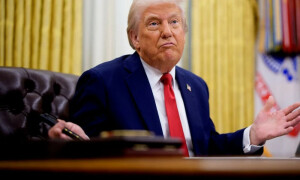France's rail operator said Monday that the rolling strikes against plans to overhaul the debt-laden company had already cost it around 100 million euros ($123 million), with neither unions nor the government showing any willingness to back down. Train drivers and other staff at the state-owned SNCF have vowed to continue walking off the job two days out of every five until at least June 28.
The stoppages are costing around 20 million euros per strike day with the disruption often spilling into non-strike days, SNCF chief Guillaume Pepy told BFM television on Monday, the fourth day of the strike. "From what I can see, France has not been paralysed," Pepy said, "but clients are being heavily penalised." Both sides are claiming broad public support, with unions pointing to 550,000 euros in donations as of Monday for a fund compensating striking workers' lost wages.
"The more solidarity we see, the more it proves that our fight is justified," Philippe Martinez of the CGT union, the largest at the SNCF, told Europe 1 radio. "Nobody wants a long, difficult conflict but for now, we're up against a wall," Martinez said. But an Ifop poll published Sunday showed 62 percent in favour of the government's reforms, compared with a slim majority of 51 percent in the same survey a week earlier.
"If we're proposing a new rail pact for the country, it's because reforming the system is essential," Transport Minister Elisabeth Borne told lawmakers as they began debating the reforms in parliament. The shake-up "has a single goal of better meeting the expectations of our fellow citizens, in particular those who use (the rail network) daily," Borne said, warning that the SNCF's economic model "is no longer viable".
President Emmanuel Macron, who has barely spoken publicly on the standoff, is set to give two high-profile television interviews this week, nearly a year after sweeping away France's traditional parties with his election victory. The 40-year-old centrist is pushing reforms for swathes of the French economy, but leftwing critics accuse him of taking a sledgehammer to public services. Rail unions oppose his plans to do away with the jobs-for-life and early retirement guarantees enjoyed by current SNCF employees.
The SNCF would also be transformed into a private company whose shares are owned by the state - which unions see as a first step toward privatisation, despite government denials. But Macron's plan to push through the changes by decree has infuriated union leaders, who denounce the parliamentary debate as a charade by a government with no real desire to negotiate. Several hundred rail workers braved steady rain for a protest in Paris, using air horns and firecrackers to make themselves heard by lawmakers in the nearby parliament.
The government says it needs to move quickly ahead of the opening of French passenger rail traffic to competition starting in 2020, part of an EU-wide opening of state rail markets. The standoff promises weeks of headaches for the network's 4.5 million daily passengers - which has coincided with a series of strikes at Air France by workers seeking a six percent raise.
The airline, in which the state owns a minority stake, said a quarter of flights would be cancelled on Tuesday, with another day of strikes set for Wednesday. Just one in five high-speed TGV trains were running Monday, compared with one in seven or eight during last week's strikes, and about 20 percent of the Eurostar trains connecting London with Paris or Brussels were cancelled. Pepy noted "quite heavy participation" in Monday's strike, though he said more trains were running overall than last week.
Traffic is forecast to gradually return to normal Tuesday morning, ahead of the next round of strikes on Friday. But Pepy warned of lasting consequences for the SNCF if the strike extends into the summer. "When our freight train clients see that the service isn't reliable... they start using the roads, and it's very difficult to get them to come back," he said.
Prime Minister Edouard Philippe warned Sunday that the government would not be deterred from the main elements of its reforms. "I get messages from people who support the government, saying we need to carry this through all the way. And that's what we are going to do," Philippe told the Parisien newspaper.
BR100
12,239
Decreased By
-154.2 (-1.24%)
BR30
36,393
Decreased By
-714.3 (-1.92%)
KSE100
114,153
Decreased By
-1379.3 (-1.19%)
KSE30
35,200
Decreased By
-461.3 (-1.29%)





















Comments
Comments are closed.